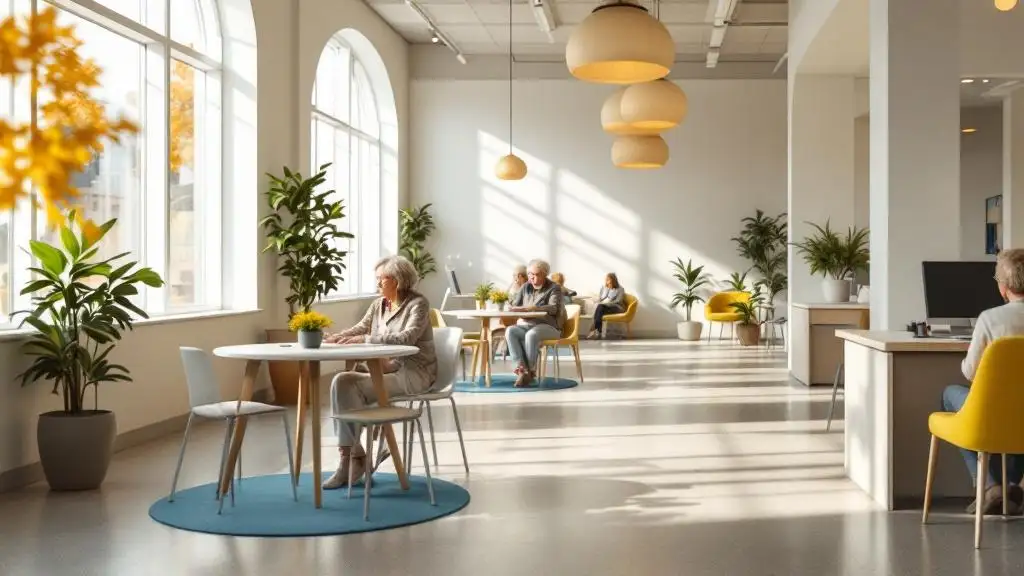Building Confidence in Technology Through Senior-Friendly Hybrid Care

Harnessing Technology and Compassion in Senior Care
As the senior population embraces longer, healthier lives, blending technology with personalized care has become a transformative approach. This article explores how senior-friendly hybrid care models, incorporating smart devices and human coaching, are building confidence in technology to promote holistic wellness, support weight management, and address common barriers through accessible programs and community engagement.
Smart Technology as a Cornerstone of Senior Wellness

How Smart Devices Monitor Senior Health
Smart devices play a vital role in tracking and supporting seniors' health. Sleep mats, for example, monitor sleep quality, sleep cycles, and heart rate, providing essential data to improve rest and wellness. Digital scales go beyond simple weight measurement—they also assess hydration levels and weight patterns, helping seniors maintain proper hydration, which is crucial for overall health.
Wearable Monitors and Fall Detection
Wearable health monitors, including rings, patches, and pendants, provide continuous tracking of vital signs such as heart rate and blood pressure. These devices also detect falls and send emergency alerts, enabling prompt responses to emergencies. Fall detection systems and smart home sensors can recognize abnormal activities like falls or wandering, immediately alert caregivers, and activate safety measures like lighting or stove shutoff. Such technologies bolster safety while promoting seniors' independence.
Managing Medications with Smart Technology
Smart medication dispensers assist seniors in adhering to their medication schedules by providing audio and visual alerts when it's time to take pills. They can dispense medications automatically, track usage, and send refill reminders. Remote monitoring capabilities via smartphone apps give caregivers peace of mind by ensuring medications are managed properly.
Voice-Activated Home Assistants Simplify Daily Life
Voice-activated assistants such as Alexa, Siri, and Google Assistant have become indispensable tools for seniors. They allow users to set medication reminders, make video calls, control home environments (like lighting and thermostats), and access news and entertainment with ease. This hands-free convenience supports daily routines, encourages independence, and reduces barriers to technology.
Telehealth Hubs Enable Remote Healthcare
Telehealth hubs, designed with user-friendly interfaces and built-in vital sign scanning, allow seniors to conduct remote check-ups and health exams from home. This reduces travel needs and helps maintain consistent healthcare connections. The combination of smart monitoring devices and telehealth services provides a comprehensive approach to managing health remotely.
How Wellness Supports Healthy Weight Maintenance
Wellness is a cornerstone of healthy weight management, intertwining physical, emotional, and mental health. Regular physical activity improves metabolism and increases calorie expenditure, facilitating weight control. Psychological well-being, including autonomy over health and effective management of physical symptoms, supports sustained motivation. Additionally, practices that reduce stress and promote balanced nutrition complement physical efforts, preventing stress-related weight gain. A holistic wellness approach that integrates these elements significantly enhances the chances of achieving and maintaining a healthy weight.
Personalized Care Programs Embracing Hybrid Delivery

What Role Do Certified Health and Wellness Coaches Play?
Certified Health and Wellness Coaches provide personalized support to seniors, guiding them through their wellness journeys. These coaches tailor interventions to meet individual needs, ensuring that physical, emotional, and social wellness aspects are addressed comprehensively. This human connection enhances motivation and fosters sustainable lifestyle changes.
How Do Programs Address Holistic Wellness for Seniors?
Wellness programs for seniors go beyond physical health by incorporating emotional and social dimensions. By emphasizing a well-rounded approach, these initiatives promote independence and overall quality of life. Activities often include chronic condition management, increased socialization, and fall prevention strategies.
What Functional Fitness Options Are Available?
One popular program is the Feeling Fit Club, designed specifically for older adults. It combines strength, balance, aerobic endurance, and flexibility exercises. The club accommodates different ability levels, making it accessible for a broad range of participants.
How Are Hybrid Formats Used to Enhance Accessibility?
The Feeling Fit Club utilizes multiple delivery methods, including in-person sessions, live virtual classes, hybrid formats, pre-recorded videos, TV broadcasts, and DVDs. This flexibility allows seniors, including those who are homebound, to participate in fitness activities from the comfort of their homes or community centers, fostering consistent engagement.
What Are the Benefits of Tai Chi Programs for Seniors?
Several evidence-based Tai Chi programs, such as Tai Chi for Arthritis and Tai Chi: Moving for Better Balance, help improve mobility, balance, strength, and flexibility. These classes reduce fall risk and pain, contributing to enhanced physical performance and relaxation. The programs are offered both virtually and at community sites, ensuring broad access.
Effective Programs for Sustainable Weight Loss
Successful weight management programs for seniors share key traits: personalization, evidence-based strategies, gradual lifestyle changes, and comprehensive support. Emphasizing balanced nutrition, regular physical activity, behavioral therapy, and consistent coaching helps maintain progress. Digital tools to track nutrition, activity, sleep, and stress support ongoing adjustments. Programs like those combining fitness classes with coaching and nutrition education align well with sustainable weight loss goals.
| Program/Component | Delivery Methods | Focus Areas |
|---|---|---|
| Certified Health Coaches | One-on-one coaching, virtual consultations | Personalized wellness coaching |
| Feeling Fit Club | In-person, virtual, hybrid, videos, TV, DVDs | Functional fitness for seniors |
| Tai Chi Programs | Virtual, community sites | Balance, mobility, fall prevention |
| Weight Loss Programs | Multi-modal, digital tracking, coaching | Nutrition, behavior change, activity |
This hybrid and personalized approach creates a supportive environment that caters to seniors' diverse needs, promoting long-term wellness and independence.
Integrating Lifestyle Changes to Support Weight Loss within Wellness Models

Which lifestyle changes are recommended as part of wellness programs to support weight loss?
Seniors looking to manage weight through wellness programs are encouraged to start with increasing daily physical activity. At least 30 minutes of exercise such as walking, aerobic activities, or other movements suited to their ability level should be incorporated. This gradual progression helps improve physical functioning and supports weight management effectively.
Nutrition is another cornerstone. A balanced diet rich in vegetables, fruits, whole grains, lean proteins like fish and beans, and healthy fats creates satiety and reduces calorie intake without restrictive dieting. Such a dietary approach aligns with well-established nutrition plans promoting overall health and wellness.
Stress management and quality sleep are crucial. Effective stress reduction techniques and ensuring restful sleep strengthen hormonal balance and recovery, both important in achieving weight loss goals.
Lastly, behavioral strategies like journaling dietary intake, setting achievable goals, and reducing sedentary periods foster the development of healthy, lasting habits. Engaging with healthcare professionals for personalized coaching provides support and guidance to tailor these changes to individual needs.
Adopting these lifestyle adjustments within a supportive wellness framework optimizes seniors’ ability to lose and maintain a healthy weight, all while boosting overall physical, emotional, and social well-being.
Addressing Challenges in Senior Weight Management Through Support and Technology

What are common challenges faced during weight loss programs, and how can they be overcome?
Weight loss for seniors often involves hurdles such as plateaus in progress, decreased motivation, emotional eating, physical pain, and time constraints. Emotional responses like stress and unrealistic expectations also affect success. Beyond personal struggles, seniors may face limited support, logistical problems, and inadequate resources, all complicating their efforts. Dietary and emotional triggers, sometimes amplified by social media, can further disrupt healthy habits.
How can motivation and emotional eating be managed?
Staying motivated while managing emotional eating requires mindful awareness and coping strategies. Setting realistic, achievable goals helps curb frustration. Establishing daily routines and seeking guidance from health and wellness professionals offer structure and encouragement. Emotional triggers can be addressed with techniques such as stress management and conscious food choices, decreasing reliance on eating as comfort.
How does technology and coaching help overcome barriers?
Smart devices like digital scales and wearable health monitors provide real-time feedback on weight, hydration, heart rate, and activity levels, empowering seniors with data to understand their habits. Smart medication dispensers and sleep mats also improve overall wellness, indirectly supporting weight management. Integration with Certified Health and Wellness Coaches offers personalized support, motivation, and tailored strategies to overcome specific barriers.
What is the role of support networks and personalized interventions?
Building a strong support network—including family, peers, coaches, and community groups—boosts accountability and emotional resilience. Personalized interventions based on individual motivators, whether improving health, socializing, or gaining independence, improve adherence. Encouraging seniors to recognize unique challenges and strengths enables customized goal setting and sustainable lifestyle changes.
How do community programs like walking groups contribute?
Walking groups promote regular physical activity and social interaction, significantly enhancing mood and reducing risks for heart disease, stroke, and cognitive decline. These groups create a social fabric that combats isolation, providing encouragement and a sense of belonging. Combined with technology and coaching, community programs form an essential part of a comprehensive senior weight management approach.
Community and Accessibility: The Role of Senior-Centered Hybrid Wellness Hubs

Senior Technology Hubs Like Curry Senior Center Tech and Wellness Hub+
The Curry Senior Center Tech and Wellness Hub+ in San Francisco stands as a pioneering community space dedicated to empowering seniors through technology. Supported by investments such as the $150,000 contribution from Sutter Health, the hub welcomes about 60 to 70 seniors daily. It features open conference rooms with vibrant neon-colored furnishings and sustainable materials, creating an inviting and practical environment for learning and social engagement.
Addressing Social Isolation Through Technology and Wellness Programs
Beyond technology education, the Hub+ addresses critical issues of social isolation, particularly among seniors living in small, unsupported settings like Single Room Occupancies (SROs). By teaching skills like using phones and tablets to access healthcare, manage finances, and connect with loved ones, the hub fosters social connectivity, which research shows is essential for improved mental and physical health.
Partnerships with Healthcare Providers
Collaborations with local healthcare organizations, such as the California Pacific Medical Center, enhance the continuum of care offered by the hub. These partnerships provide seamless follow-up services, combining technological training with wellness programming to ensure seniors receive comprehensive support tailored to their needs.
Inclusive Programming and Accessible Delivery Methods
Senior wellness programs are designed with accessibility in mind, offering hybrid models that include in-person, virtual, and hybrid classes. This flexibility accommodates seniors with varying mobility and access needs, from functional fitness programs like the Feeling Fit Club to Tai Chi classes that promote balance and fall prevention.
Community Groups Supporting Fall Prevention and Healthy Aging
Community coalitions such as the Fall Prevention Task Force and Age-Friendly Community Teams actively work to create inclusive environments that support active aging. These groups focus on fall prevention, chronic condition management, increased socialization, and overall healthy aging, complementing the services provided by senior-centered wellness hubs.
The integration of these elements within hybrid wellness hubs highlights how combining technology, community engagement, and healthcare partnerships can effectively support seniors' independence, wellness, and quality of life.
Empowering Seniors with Confidence and Care
The integration of user-friendly technology with personalized coaching and community support is reshaping senior wellness. Hybrid care models not only provide tools for monitoring and managing health but also foster independence, social connection, and emotional wellbeing. By embracing this approach, seniors can overcome common weight management challenges and maintain healthier lifestyles grounded in holistic wellness. As these programs continue to evolve, expanding access and refining technologies will be key to ensuring that all older adults can confidently engage with and benefit from innovations that enhance their quality of life.
References
- Smart Technology: A Wellness Partner for Seniors
- Healthy Living
- Easy-to-Use Tech Devices That Are Boosting Senior ...
- Wellness Hub Helps Seniors Embrace Technology, Build ...
- Revolutionizing Senior Wellness: A Vision for the Future
- The 5 Best Weight Loss Programs in 2025
- Steps for Losing Weight | Healthy Weight and Growth
Recent articles
Want to Feel Better and Live Healthier?
Join hundreds of patients taking control of their health with personalized care that fits their life – not the other way around.
Rated 4.8/5 by 32+ customers







